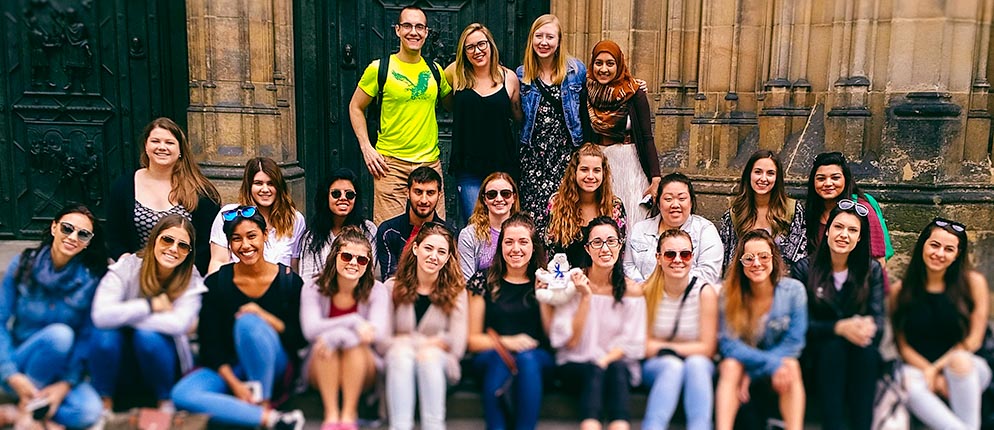- Future Students
- Current Students
- Faculty
- Staff
- Alumni
- Others
Raising autism awareness while on Study Abroad
 Photo by Elena Merenda
Photo by Elena Merenda
For two weeks this summer, Prague had a special visitor. The old-world charm of the city’s cobblestone bridges, gas lamps and gothic architecture was joined by a small plush polar bear. His name is Tikko, and he’d traveled all the way from Toronto to spread awareness about Autism Spectrum Disorder.
Students and faculty from the University of Guelph-Humber brought Tikko for their Study Abroad trip to the Czech Republic, making it the latest of the bear’s many international journeys. Since 2010, the plush toy has been the face of Tikko Travels, an autism awareness initiative that started with a young boy in Ontario named Dorian Poe.
After years of struggling in the public school system, seven-year-old Dorian wanted to alert more people to what it means to be autistic. He started by sending his favourite plush bear with a family friend as they left for a trip, and when they returned with photos and stories, Dorian soon sent Tikko, along with information about autism, all around the world. Dressed in a small shirt that says, “Autism — It’s okay to be different”, Tikko is carried around by volunteer ambassadors who take photos with the toy as they spread the word about autism abroad.
Tikko made his way to Prague thanks to Ryley Liddle, a UofGH Media Studies student who’s entering her third year of study. After hearing about the initiative from friends, Ryley was eager to take part.
“I’ve found there are a lot of misconceptions about what people with autism can and can’t do, so taking part in this seemed like a great chance to educate people,” Ryley says. “Having autism doesn’t mean you’re any less intelligent, capable or talented, but most people don’t really understand that.”
Now a Tikko Ambassador, Ryley regularly teaches others about living with autism and how to be more supportive of those who are on the spectrum. She brings Tikko to school with her at UofGH and is happy to share with students, faculty or anyone else about the initiative.
“I’d like to see people with autism treated just like everyone else,” she says. “That means more inclusion, support and — especially on campuses — to recognize the diversity we have among our people. We all have things that make us different, and I hope that greater understanding comes with greater acceptance and inclusion for people with autism.”
Ryley and the Study Abroad group brought Tikko with them as they visited Prague’s landmarks, like the Old Town Square, Mirror Maze and the ninth-century Prague Castle, posing for pictures along the way. When people asked, Ryley would tell them about autism and Tikko Travels.
We all have things that make us different, and I hope that greater understanding comes with greater acceptance and inclusion for people with autism.”
For Elena Merenda, Assistant Program Head of Early Childhood Studies at UofGH and one of the leaders of the Study Abroad trip, bringing along Tikko was one piece of a much-needed cultural change.
“There needs to be a shift in our society and our schools,” she says. “We have to understand that all kids are different and come with their own needs and abilities. Not every child can sit in a chair all day at school, and that’s okay.”
Because Ryley brought along Tikko other students became interested in the initiative, and Ms. Merenda says it opened the door for an important learning opportunity.
“The field of early childhood education is changing and we’re seeing more and more educators serving as leaders in healthy child development,” she says. “But, not all of us have loud voices so, it’s important that we teach our students how to be effective advocates for children and families as they go into the workforce. This is a great way for them to learn that.”
Tikko is now back home, but he’ll be travelling again before long.
Learn more about Study Abroad at UofGH.

